Deposition
Deposition is the process by which sediments, soil, and rocks are added to a landform or landmass. It is one of the key processes in the geological cycle, which also includes erosion, transportation, and lithification.
Key Points to Remember:
- Deposition is the process of dropping or depositing sediment in a new location.
- It is the opposite of erosion, where sediments are removed from a landform.
- Deposition can occur through various natural processes such as wind, water, ice, and gravity.
- Examples of deposition include the formation of sand dunes, river deltas, and sedimentary rock layers.
- Deposition is an essential part of the rock cycle and contributes to the formation of new geological formations over time.
Study Guide Questions:
- What is deposition and how does it differ from erosion?
- Describe the various natural processes that can lead to deposition.
- Provide examples of landforms or geological features that are formed as a result of deposition.
- Explain the significance of deposition in the context of the rock cycle and the formation of Earth's landscapes.
[Deposition] Related Worksheets and Study Guides:
.◂Science Worksheets and Study Guides Second Grade. Water Habitats
Study Guide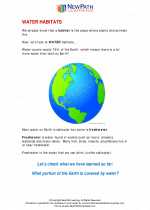 Water Habitats
Water Habitats  Activity Lesson
Activity Lesson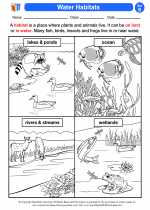 Water Habitats
Water Habitats  Worksheet/Answer key
Worksheet/Answer key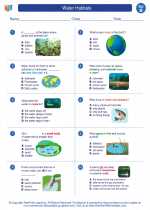 Water Habitats
Water Habitats  Worksheet/Answer key
Worksheet/Answer key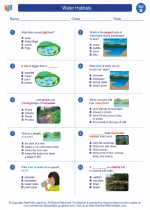 Water Habitats
Water Habitats  Worksheet/Answer key
Worksheet/Answer key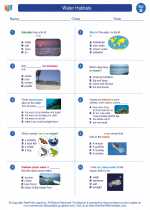 Water Habitats
Water Habitats  Worksheet/Answer key
Worksheet/Answer key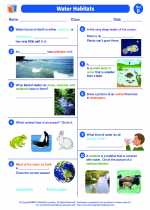 Water Habitats
Water Habitats  Vocabulary/Answer key
Vocabulary/Answer key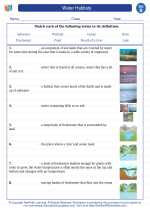 Water Habitats
Water Habitats  Vocabulary/Answer key
Vocabulary/Answer key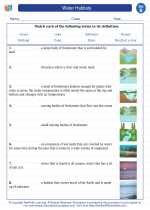 Water Habitats
Water Habitats 

 Activity Lesson
Activity Lesson
 Worksheet/Answer key
Worksheet/Answer key
 Worksheet/Answer key
Worksheet/Answer key
 Worksheet/Answer key
Worksheet/Answer key
 Worksheet/Answer key
Worksheet/Answer key
 Vocabulary/Answer key
Vocabulary/Answer key
 Vocabulary/Answer key
Vocabulary/Answer key

The resources above cover the following skills:
LIFE SCIENCE (NGSS)
Biological Evolution: Unity and Diversity
Students who demonstrate understanding can:
Make observations of plants and animals to compare the diversity of life in different habitats[Clarification Statement: Emphasis is on the diversity of living things in each of a variety of different habitats.] [Assessment Boundary: Assessment does not include specific animal and plant names in specific habitats.]